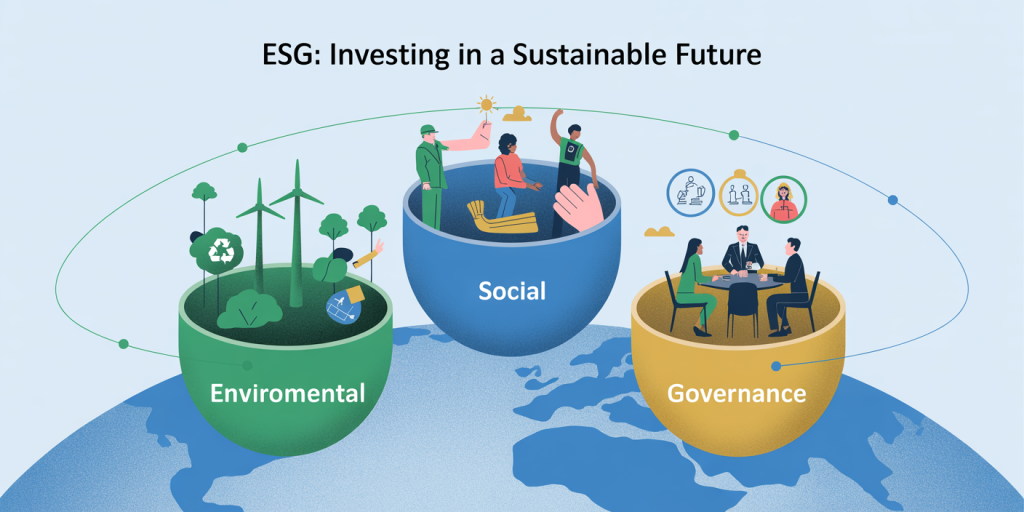In an era where sustainability and corporate responsibility are no longer optional, Environmental, Social, and Governance (ESG) criteria have emerged as essential metrics for evaluating companies’ ethical and operational performance. Investors, regulators, and consumers alike increasingly demand transparency and accountability in how organizations address ecological challenges, social equity, and governance practices. But what exactly does ESG entail, and why is it vital for individuals, businesses, and society at large to care about it? This article delves into the core of ESG, explaining its components, significance, and impact on investment decisions and overall corporate strategy.
Understanding ESG: Beyond the Acronym
ESG stands for Environmental, Social, and Governance, three central factors used to measure the sustainability and societal impact of an investment in a company or business. Unlike traditional financial analysis, which focuses primarily on revenue, expenses, and profitability, ESG factors assess how well a company manages risks and opportunities related to environmental and social issues, as well as corporate governance.
Environmental factors examine a company’s footprint in areas such as climate change, natural resource use, waste management, and pollution control. For instance, Tesla’s commitment to producing electric vehicles not only addresses reducing carbon emissions but also signals the company’s alignment with environmentally responsible innovation.
Social criteria focus on how a company handles relationships with employees, suppliers, customers, and communities. This could include workplace diversity policies, labor standards, and community engagement. Starbucks, for example, has long emphasized ethical sourcing and fair trade practices, striving to ensure social responsibility within its supply chains.
Governance involves the structures and controls established to ensure accountability, fairness, and transparency in corporate leadership. It includes board composition, executive compensation, shareholder rights, and ethical business practices. Companies like Microsoft are often highlighted for their strong governance frameworks, promoting ethical conduct and robust oversight mechanisms.

The Growing Importance of ESG in Modern Investing
The integration of ESG criteria into investment decisions has become a global trend. According to the Global Sustainable Investment Alliance, assets managed under sustainable investing strategies reached over $35 trillion in 2020, a 15% increase from 2018. This data underscores the surging interest in ESG as a tool for assessing long-term value beyond mere financial returns.

Institutional investors, including pension funds and insurance companies, recognize that companies with strong ESG profiles tend to be less risky and more likely to outperform their peers over time. For example, a 2020 study by Morningstar found that 73% of sustainable equity funds outperformed comparable traditional funds during the first half of that year, highlighting the financial benefits of ESG-conscious investments.
In practical terms, ESG investing encourages companies to mitigate environmental risks such as regulatory changes linked to carbon pricing or water scarcity. It also pressures businesses to improve labor conditions and foster inclusive workplaces, reducing social risks. Effective governance, on the other hand, minimizes the chance of scandals or fraud, protecting shareholder value.
Environmental Criteria: Tackling Climate Change and Resource Management
Environmental factors in ESG have gained heightened attention amid the global climate crisis. Corporate environmental responsibility involves reducing greenhouse gas emissions, sourcing renewable energy, managing waste, and conserving natural habitats. Walmart, for example, has committed to achieving 100% renewable energy use and zero waste in its operations, reflecting broader industry shifts toward sustainability.
The rise of environmental disclosure frameworks such as the Task Force on Climate-related Financial Disclosures (TCFD) helps companies report climate-related impacts in a standardized manner. This facilitates better risk assessment for investors and stakeholders. According to the Carbon Disclosure Project (CDP), companies that actively measure and manage their environmental impact reduce operational costs by an average of 12%.
To illustrate, consider a comparative table outlining key environmental initiatives by three leading corporations:
| Company | Carbon Reduction Commitment | Renewable Energy Usage | Waste Management Strategy |
|---|---|---|---|
| Walmart | Net-zero emissions by 2040 | Target 100% by 2035 | Zero waste to landfill by 2025 |
| Tesla | 100% electric vehicles | Solar energy projects | Battery recycling programs |
| Unilever | Carbon neutral by 2039 | 100% renewable electricity | Circular economy packaging initiatives |
This table emphasizes the varying approaches companies take to environmental sustainability, each aligned with their core business models but collectively contributing to global ESG goals.
Social Criteria: Shaping Equitable and Inclusive Societies
Beyond the environment, the social dimension of ESG addresses human rights, labor practices, workplace safety, customer privacy, and community relations. Companies that excel in social responsibility improve employee satisfaction, reduce turnover rates, and build stronger brand reputations.
One notable example is Salesforce, which promotes equal pay and diversity in the workplace. The company regularly audits salary structures to close gender and racial pay gaps and has publicly committed to increasing workforce diversity. Similarly, Patagonia’s emphasis on fair labor practices and community activism positions the brand as a socially responsible leader.
Social issues have material financial implications as well. According to a report by McKinsey, diverse companies outperform less diverse peers by 36% in profitability. Moreover, companies that invest in employee well-being and community support tend to enjoy higher customer loyalty and lower risks of reputational damage.
Here’s a comparison of how social factors are addressed by three companies:
| Company | Diversity & Inclusion Initiatives | Labor Practices | Community Engagement |
|---|---|---|---|
| Salesforce | Regular pay equity audits | Comprehensive benefits | Supports local education and equality groups |
| Patagonia | Fair wages & worker safety | Transparent supply chains | Environmental activism and donations |
| Starbucks | Commitment to racial equity | Health & education benefits | Coffee sourcing support for farming communities |
These examples demonstrate that social factors are deeply intertwined with a company’s ethical standing and long-term sustainability.

Governance Criteria: Ensuring Corporate Integrity and Accountability
Governance issues are fundamental to maintaining investor confidence and operational transparency. Strong governance reduces corruption, prevents conflicts of interest, and ensures compliance with laws and regulations. The governance pillar often encompasses board diversity, shareholder rights, executive remuneration, and ethical business practices.
A real case highlighting the importance of governance is the Volkswagen emissions scandal in 2015, where manipulated emissions tests led to severe reputational damage and legal penalties. This incident underlines the cost of poor governance and lack of transparency.
Conversely, companies like Johnson & Johnson maintain high governance standards by separating the roles of CEO and board chair, thereby fostering independent oversight. They also uphold stringent compliance programs to avoid ethical lapses.
Investors increasingly scrutinize governance practices as a proxy for overall corporate health. According to Institutional Shareholder Services (ISS), firms with better governance scores tend to have lower volatility and better risk-adjusted returns.
The following table outlines governance practices in three companies:
| Company | Board Structure | Executive Compensation | Shareholder Rights | Ethics & Compliance Programs |
|---|---|---|---|---|
| Volkswagen | Previously centralized | Controversial | Investor lawsuits | Weak controls pre-2015 |
| Johnson & Johnson | Independent chair/CEO | Performance-based | Strong voting mechanisms | Robust ethics training |
| Microsoft | Diverse, independent | Transparent and fair | Shareholder-friendly | Comprehensive compliance framework |
This comparison highlights how governance structures impact corporate resilience and stakeholder trust.
Why ESG Matters to You: Individuals, Investors, and Businesses
Understanding ESG matters because it affects how your money, work, and consumer choices contribute to a more sustainable world. For individual investors, ESG investing offers a way to align portfolios with personal values while potentially earning competitive returns. For example, investing in renewable energy companies supports the transition to a low-carbon economy while targeting growth sectors.
For businesses, embracing ESG frameworks is increasingly necessary to attract capital, comply with regulations, and build competitive advantage. According to Deloitte’s 2022 Global Survey, 68% of executives reported that ESG investments enhance innovation and improve financial performance.
Consumers also wield power by favoring brands committed to ESG principles, often willing to pay premium prices for ethically produced goods. This shift pressures companies to prioritize ESG in their operations to retain market share.
Future Perspectives: The Evolving ESG Landscape
Looking ahead, ESG is expected to become deeply embedded across all facets of economic activity. Regulatory bodies globally are tightening disclosure requirements—such as the European Union’s Sustainable Finance Disclosure Regulation (SFDR) and the U.S. Securities and Exchange Commission’s proposals on climate-related disclosures—mandating greater transparency.
Technological advances, such as blockchain and AI, will also enhance ESG data collection and reporting, making it easier to track corporate sustainability performance accurately. Meanwhile, growing public awareness and activism will push companies to adopt more ambitious ESG targets.
Moreover, sustainable finance is projected to continue its rapid expansion. The Brookings Institution estimates that sustainable investing assets could reach $53 trillion by 2025, encompassing 50% of all professionally managed assets globally. This trend signals that ESG is no longer a niche concern but a central pillar shaping future economic landscapes.
Businesses that proactively embed ESG into their core strategies are likely to secure long-term resilience, attract loyal customers, and mitigate emerging risks. Likewise, investors and consumers who integrate ESG considerations into decisions will contribute to a more sustainable and equitable future.

Deixe um comentário